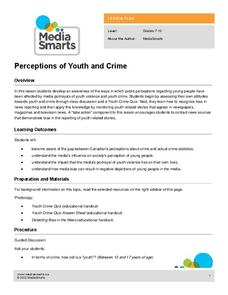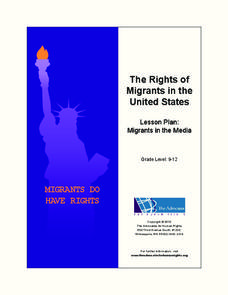Rockefeller Archive Center
Understanding Mass Media News
In an age of fake news and photoshopped images, it is vital that 21st century learners development the skills they need to evaluate mass media and assess its validity. A great way to launch such a study is with a carefully crafted lesson...
Curated OER
Fighting Fake News
Fake news. Alternative facts. Internet trolls. In an age of Newspeak, it's increasingly important to equip 21st century learners with the skills needed to determine the legitimacy of claims put forth on social media, in print, and in...
Facing History and Ourselves
#IfTheyGunnedMeDown
As part of their continued investigation of the reporting of the shooting of Michael Brown class members analyze photos of Michael Brown and the social media response to these images. The class then develops a guide they believe news...
Facing History and Ourselves
The Power of Images
One picture but a thousand stories. As a part of a case study of how the death of Michael Brown was reported by professional news sources and on social media class members examine the reactions of various groups to a photograph taken by...
Media Smarts
Perceptions of Youth and Crime
Explore the potential for bias in the news and in scholars' own attitudes and opinions. Begin with a quiz on youth crime to see how learners perceive crime among their peers. After looking at the correct answers, put individuals in...
PBS
Amid Rising Economic Inequality, Does America Need a Third Reconstruction?
Young political scientists investigate the Poor People's Campaign protest held in Washington, D.C., on June 18, 2022. They research how the event was reported in various news outlets and consider their stance on whether "poverty is...
Anti-Defamation League
Is Olympic Coverage Sexist?
Women Olympians have come a long way since 1900 when 22 women competed for the first time. News coverage of the Olympics has also changed dramatically. What has been slow to change, however, is the language used in the coverage of female...
Facebook
Metadata
In previous lessons, young journalists learned about how to trace the original source of scrapes and memes. This interactive lesson plan teaches them another important step in the verification process. Participants learn how to analyze...
News Literacy Project
News Goggles: Newsroom Lingo Review
Learn how to talk like a journalist. Throw around jargon like "lede" and "nut graf." A 20-slide presentation introduces viewers to words and phrases heard in the fast-paced newsroom.
PBS
Decoding Media Bias
Alternative facts? After watching the We The Voters film, "MediOcracy," viewers compare how cable news outlets CNN, Fox News, and MSNBC report the same story about politics or public policy. After a whole-class discussion of their...
Teaching Tolerance
Racial Disparity in the Criminal Justice System
Explore the impact of the war on drugs in a thought-provoking lesson plan for high school academics. Young historians delve into the world of the criminal justice system and the racial disparity that occurs in the US. The resource...
Encyclopedia Britannica
Candidate Flip-Flop or Evolution?
Beware political rhetoric! Connotation is everything! Groups select a presidential candidate and investigate how the candidate's position has changed on a specific issue. After analyzing the situation, the group determines whether they...
Constitutional Rights Foundation
Understanding Fake News
Fake or fact? Learners must decide while looking at two published "news" stories. A reading about why fake news exists and a checklist on how to evaluate sources rounds out the activity.
Stanford University
Hurricane Katrina
The adage says that journalism is the first draft of history. How should people evaluate these sources of information? Taking into account various sources, including those from various perspectives and different creators, learners...
National Woman's History Museum
African American Activists
Ida B. Wells, Rosa Parks, and Fannie Lour Hammer are three African American activists who stood up for change. Though living in different time periods, all three women sought justice and equality. Class members examine primary source...
PBS
The Media and the War: The Penny Press, Walt Whitman and the War
The Mexican-American war marked a significant moment in United States history, as well as in the history of American media. The mid-nineteenth century saw the introduction of the Penny Press, which provided many American citizens with...
Facing History and Ourselves
The Nazis in Power: Propaganda and Conformity
The Nazis used the power of propaganda to encourage confirmative views and the discrimination of Jews. A social studies resource illustrates these issues through discussion, image analysis, and a writing exercise.
American Press Institute
Creating a Classroom Newspaper
Hot off the press: a mini-unit for class members to create their own newspaper. Complete with graphic organizers, extension activities, and helpful learning targets that teach parts of a newspaper, the resource contains everything needed...
American Press Institute
Media Literacy: Where News Comes From
What actually happens at a press conference? Make sense of the mayhem with a mock press conference activity designed to promote media literacy. Individuals participate as either members of the press or the governor's office to examine...
Southern Poverty Law Center
Analyzing How Words Communicate Bias
Words are powerful ... can your class choose them wisely? Scholars evaluate news articles to discover the concepts of tone, charge, and bias during a media literacy lesson. The resource focuses on recognizing implicit information and...
Southern Poverty Law Center
Evaluating Online Sources
All sources are pretty much the same, right? If this is how your class views the sources they use for writing or research projects, present them with a media literacy lesson on smart source evaluation. Groups examine several articles,...
iCivics
Lesson 3: Bias
How do journalists balance bias and ethical reporting? The final instructional activity in a series of five from iCivics examines the different types of bias and how they affect the news we read. Young reporters take to the Internet to...
iCivics
Lesson 2: Misinformation
Fake news is a hot topic right now ... but what is it? Intrepid young investigators track down the facts that separate journalistic mistakes and misinformation through reading, research, and discussion. Part three in a five-lesson series...
Advocates for Human Rights
Migrants in the Media
Class members examine two documents—The Universal Declaration of Human Rights and The Rights of Migrants in the United States—and then use reports in the media to assess how well the US is doing in ensuring these rights.

























